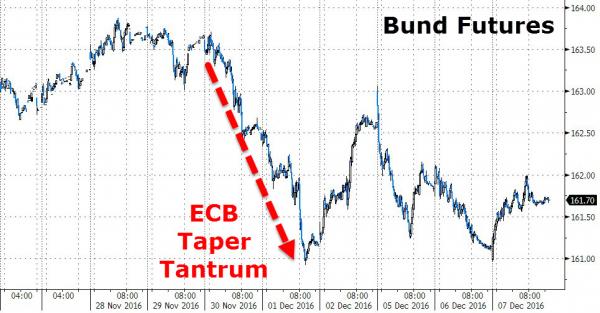Blackrock’s chief multi-asset strategist summed up the anxiously awaited ECB meeting best by noting that “what’s priced into markets is a fully fledged extension of the [bond-buying] program,” but warns that, thanks to a muted reaction to the Italy vote and recent encouraging data, “there’s a significant chance the ECB disappoints markets.” As bond traders bet on a six-month QE extension, Citi warns, anything less will be seen as hawkish and send EUR surging.
The ECB has a recent history of disappointing investors expecting more stimulus, and as The Wall Street Journal reports, with the bond-buying program scheduled to end in March, the ECB is running out of time to inform investors of its plans.
Just last week, Bunds had a mini taper tantrum when rumors spread…

And, even as investors expect more stimulus on Thursday, the debate with some analysts is moving to whether the ECB could start tapering its stimulus program in March.
As far as the actual policy decision goes, the biggest problem for the central bank remains, as Bloomberg points out, that underlying inflationary pressure is too weak and shows no signs of picking up. Headline inflation accelerated a little in November, broadly in-line with the ECB’s forecast of 0.5% for 4Q, but it looks to have done so thanks to movements in food prices. Core and services price inflation are stuck at 0.8% and 1.1%, respectively. And even though unemployment continues to fall, the wages data bring little cause for optimism. There’s unlikely to be much movement in the core inflation forecasts, but revisions downward are more likely than upward. It will also be the first time forecasts for 2019 will be published — how the ECB marks its own homework may help with understanding risks to the policy outlook.
There remains no sign of underlying cost pressure building. Until there is, further easing looks inevitable. The Governing Council has faith in its tools — it thinks inflation would have been lower if they had not been deployed — and there is reason to keep using them. BI Economics therefore expects an extension to the program of asset purchases.

